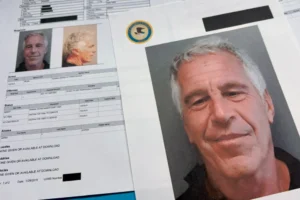Too Much? Many Americans Feel the Need to Limit Their Political News, AP-NORC/USAFacts Poll Finds
- Published In: Politics
- Last Updated: Sep 15, 2024

Viewers gather to watch a debate between Democratic presidential nominee Vice President Kamala Harris and Republican presidential nominee former President Donald Trump at the Angry Elephant Bar and Grill, Tuesday, Sept. 10, 2024, in San Antonio. (AP Photo/Eric Gay)
By DAVID BAUDER and LINLEY SANDERS
NEW YORK (AP) — When her husband turns on the television to hear news about the upcoming presidential election, that’s often a signal for Lori Johnson Malveaux to leave the room.
It can get to be too much. Often, she’ll go to a TV in another room to watch a movie on the Hallmark Channel or BET. She craves something comforting and entertaining. And in that, she has company.
While about half of Americans say they are following political news “extremely” or “very” closely, about 6 in 10 say they need to limit how much information they consume about the government and politics to avoid feeling overloaded or fatigued, according to a new survey from the Associated Press-NORC Center for Public Affairs Research and USAFacts.
Make no mistake: Malveaux plans to vote. She always does. “I just get to the point where I don’t want to hear the rhetoric,” she said.
The 54-year-old Democrat said she’s most bothered when she hears people on the news telling her that something she saw with her own eyes — like the Jan. 6, 2021, attack on the U.S. Capitol — didn’t really happen.
“I feel like I’m being gaslit. That’s the way to put it,” she said.
Sometimes it feels like ‘a bombardment’
Caleb Pack, 23, a Republican from Ardmore, Oklahoma, who works in IT, tries to keep informed through the news feeds on his phone, which is stocked with a variety of sources, including CNN, Fox News, The Wall Street Journal and The Associated Press.
Yet sometimes, Pack says, it seems like a bombardment.
“It’s good to know what’s going on, but both sides are pulling a little bit extreme,” he said. “It just feels like it’s a conversation piece everywhere, and it’s hard to escape it.”
Media fatigue isn’t a new phenomenon. A Pew Research Center survey conducted in late 2019 found roughly two in three Americans felt worn out by the amount of news there is, about the same as in a poll taken in early 2018. During the 2016 presidential campaign, about 6 in 10 people felt overloaded by campaign news.
But it can be particularly acute with news related to politics. The AP-NORC/USAFacts poll found that half of Americans feel a need to limit their consumption of information related to crime or overseas conflicts, while only about 4 in 10 are limiting news about the economy and jobs.
Sometimes it feels like ‘a bombardment’
Caleb Pack, 23, a Republican from Ardmore, Oklahoma, who works in IT, tries to keep informed through the news feeds on his phone, which is stocked with a variety of sources, including CNN, Fox News, The Wall Street Journal and The Associated Press.
Yet sometimes, Pack says, it seems like a bombardment.
“It’s good to know what’s going on, but both sides are pulling a little bit extreme,” he said. “It just feels like it’s a conversation piece everywhere, and it’s hard to escape it.”
Media fatigue isn’t a new phenomenon. A Pew Research Center survey conducted in late 2019 found roughly two in three Americans felt worn out by the amount of news there is, about the same as in a poll taken in early 2018. During the 2016 presidential campaign, about 6 in 10 people felt overloaded by campaign news.
But it can be particularly acute with news related to politics. The AP-NORC/USAFacts poll found that half of Americans feel a need to limit their consumption of information related to crime or overseas conflicts, while only about 4 in 10 are limiting news about the economy and jobs.













